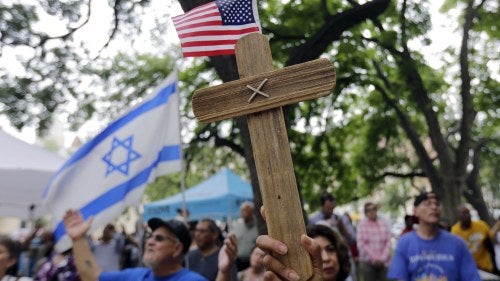American Evangelicals' Unique Support for Israel

American evangelical Christians demonstrate a unique affinity for the nation of Israel, highlighted by their views of the ongoing war in the Middle East.
While most may not immediately associate Christian evangelism with the state of Israel—a Jewish state since its 1948 founding—the unique views of America’s evangelicals help underpin the US-Israel bilateral relationship.
Evangelical Christians, sometimes called evangelical Protestants, tend to be differentiated from mainline Protestants by more fundamentalist theology and conservative values. According to the 2024 Chicago Council Survey, roughly one in eight Americans (13%) place themselves within the white evangelical Protestant category,1 or roughly 44 million people. Many of these of white evangelical Protestants (61%) identify as Republicans, while few identify as Democrats (9%), stemming from a backlash against the Democratic Party’s embrace of civil and voting rights in the 1960s (especially in the South). Eight in 10 voted for former President Donald Trump in both the 2016 and 2020 elections.
Many evangelicals maintain that the continued existence of Israel is key to their understanding of the end times, as explained in the Book of Revelations. They believe that Jews must possess their own country in the Holy Land of Israel before the second coming of Jesus can occur, which is seen as the ultimate goal in Christian theology, with the establishment of a Christly kingdom on Earth. These distinctive religious beliefs lead to significant differences in evangelicals’ views of Israel compared to other Americans.
For one, evangelicals are far more likely to believe that Israel’s existence is the result of direct divine intervention or favor. According to a compilation of two 2013 polls by Pew Research, the percentage of white evangelical Christians that say Israel was given to the Jewish people by God is on par with the percentage of ultra-Orthodox Jews who say the same (82% and 81%, respectively). By comparison, 44 percent of the overall American public and 55 percent of all Christians hold the same opinion.2
Evangelicals’ unique views of Israel also affect their views of US policy decisions. For example, in 2018 the United States under Trump moved the US embassy in Israel from Tel Aviv to Jerusalem. This decision was widely controversial because it indicated that Washington was effectively acknowledging Jerusalem as the capital of Israel over Tel Aviv, overriding more than 70 years of international agreements on the status of Jerusalem.
A poll by the University of Maryland, conducted November 1-6, 2017, presented Americans with arguments for and against the embassy move. The contention lies in what image the move could project to the rest of the world. The argument against is that moving the embassy would “[violate] international norms” and would “[generate] anti-American sentiments among Arabs and Muslims globally.” The reasoning for the move is that it would solidify the “commitment of the US to the State of Israel” and mark that the US acknowledges Jerusalem as the official capital of Israel. After hearing the arguments, nearly two-thirds of Americans (63%) said they opposed the pending relocation (31% supported). But it was a much more popular policy among evangelical Americans, whom Trump claimed in 2020 that the move was for, with a majority in favor (53%, 40% opposed).
Today, American evangelicals hold notably different views on the ongoing Israel-Hamas war. In the 2024 Chicago Council Survey, fielded June 21–July 1, 64 percent of white Protestant evangelicals maintain that Israel is defending its interests and is justified in its military actions in Gaza, roughly double that of the overall population (32%). It’s also a far greater proportion than is true of other religious groups, including Catholics (34%) or non-evangelical Protestants (31%), and far more than non-religious Americans (19%).3
White evangelicals are also far more likely to say the United States is not aiding Israel enough. One-third (35%) of evangelical or born-again Christians believe Washington is not providing enough support to Israel, compared to 20 percent of the overall population and just 10 percent of atheist, agnostic, or otherwise non-believing Americans.
When asked whether the United States should restrict the military aid it sends to Israel, 60 percent of evangelicals oppose the restrictions. This is compared to 42 percent of the overall population and roughly a fifth of both Catholics (42%) and mainline Protestants (39%). For non-religious Americans, only 32 percent hold the same position on the issue. The disparities in opinion across the subgroups indicate unique evangelical support for Israel, regardless of the wider perceptions and impact of their actions.
Conclusion
The war in Gaza has only served to highlight the difference between the overall US population and evangelicals when it comes to policy on Israel. To them, that entire land belongs to the Jewish people by divine ordinance, full stop, meaning that discussions of the occupation are not controversial—they’re just completely irrelevant. Seen in the rhetoric surrounding the move of the embassy and the way that politicians on the right wing of American politics talk about the Israel-Hamas conflict, the influence Christian religious beliefs and evangelicalism has on US policy towards Israel is strong and overt.
- 1
We split out white protestant evangelicals from other evangelicals because of their historically different relationship to the Republican Party and their generally different views on a range of issues.
- 2
In another contrast, few Christians living in Israel itself hold this view: just 19 percent, according to a 2016 Pew study.
- 3
The sample size for self-described Jews was too small to include.


Related Content
 Public Opinion
Public Opinion
Whether attacked by its neighbors or Tehran, majorities of Americans oppose using US troops to come to Israel’s defense.
 Public Opinion
Public Opinion
Pluralities also say the United States has given Israel either the right amount or not enough military assistance and support.
 US Foreign Policy
US Foreign Policy
The US public is now equally split on whether Israel’s war against Hamas in Gaza is justified or not.
